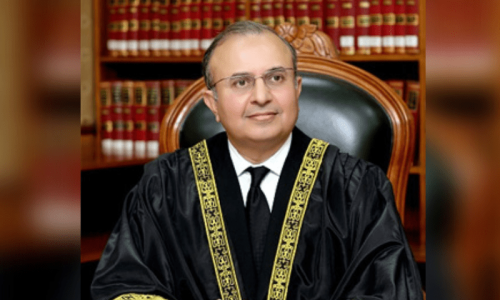IT is apparent that efforts are underway to save the peace process in Afghanistan on the global and regional levels. The unannounced visit of army chief Gen Qamar Bajwa heading a delegation to Kabul on Tuesday must be seen from this perspective. Gen Bajwa, while in the Afghan capital, met both President Ashraf Ghani as well as Abdullah Abdullah, the second most powerful office-holder in Afghanistan. As expected, intra-Afghan peace efforts were the focus of the discussion, with Dr Abdullah highlighting “Pakistan’s constructive role in this regard”. Gen Bajwa’s Kabul visit came soon after Zalmay Khalilzad, America’s point man for Afghanistan, visited Islamabad and Kabul, as well as meeting Afghan Taliban representatives in Doha. Clearly, as the Americans eye their complete exit from Afghanistan, they are encouraging efforts for a settlement in the war-torn country to ensure the fiasco that ensued after the Soviet withdrawal over three decades ago is not repeated.
From a local standpoint, it seems odd that the Kabul sojourn was a military-led initiative, with the ISI chief accompanying the army chief, and the newly appointed special envoy for Afghanistan serving as a token civilian representative. Legitimate questions arise about whether the elected government is disinterested in the Afghanistan file, or if it is being told to stay away. Even in previous engagements, Mr Khalilzad and other senior foreign visitors have been more interested in meeting the military leadership, as the latter is viewed as having the final say in key matters. Perhaps if the foreign minister or some other senior civilian functionary had headed the delegation, it would have provided for better optics. Looking at the larger picture, it appears that the US doesn’t want to be blamed for leaving a mess in Afghanistan after its troops board the last American military flight out of Kabul. This explains why in the aftermath of much discord and a bitterly contested election, Mr Ghani and Dr Abdullah were ‘prompted’ to share power by the US, after Washington cut significant amounts of aid for the Afghan government. The recent shuttle diplomacy is part of the same process. Regardless of America’s intentions, the Afghans themselves — the government as well as the Taliban — must take the lead in brokering a lasting peace, and regional states, including Pakistan, must facilitate the process. Without a workable agreement, the descent of Afghanistan into more violence post-US withdrawal cannot be ruled out.
Published in Dawn, June 11th, 2020








































